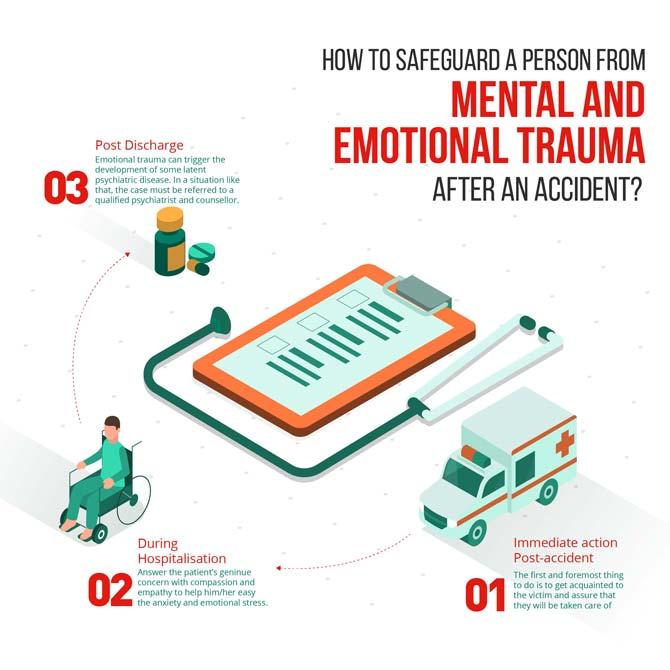These measures will help to provide immediate physical and mental aid to accident victims to deal with mental and emotional trauma

Representational Picture
Thousands of accidents happen every year in India. Some are caused due to careless driving; some are workplace hazards and some happen due to personal negligence. All these incidents lead to trauma and injury. However, the impact of an accident is almost always beyond the immediate physical damage caused. The extent of trauma caused due to these accidents and the unpredictability of these events cause a psychological effect also.
The impact can vary from mild to severe, depending on an individual’s capacity to respond to such a situation. It also depends upon various factors such as the nature of the accident, extent of the physical injury, severity of pain, associated social and financial issues, personality traits, support systems available, and more. This list is almost infinitely long. It is important to know the measures to safeguard the patient and provide immediate physical and mental aid. These measures can be divided into three categories, immediate action post-accident, during hospitalisation, and post-discharge.
ADVERTISEMENT

Immediate action Post-accident
As a first responder or caregiver, the person-in-charge has to identify the issue and offer assistance to the patient, for both physical injuries as well as mental trauma. The first and foremost thing to do is to get acquainted with the victim and assure that they will be taken care of. The accident victim should be well aware of whether the person-in-charge is a doctor, nurse, or paramedic, or a person trained in first aid. This will help reduce the patient’s anxiety to some extent, and reassure him that he/she is in good hands. He should then be gently asked if he can provide the name and contact number of the next of kin, so they can be informed about the mishap. The knowledge that his near and dear ones are on the way will also help reduce his anxiety and provide him comfort.
During Hospitalisation
While at the hospital, the accident victim might be experiencing a torrent of emotions such as shock, disbelief, anger, fear, and more. As a result, after the patient has recovered from the initial mental shock, he will be experiencing pangs of anxiety regarding several issues. He/she may be mentally disoriented, delirious and confused and wonder about the grim possibilities that the future course of events might take. There might be questions pertaining to his/her life, ability to continue a normal life after the accident, financial cost that might be incurred while being treated, concerns about the well-being of the family and many other factors that may affect the physical and mental wellbeing. These are genuine concerns and are very sensitive subjects while the patient is already suffering, it is of utmost importance that these questions are answered with compassion and empathy.
Post-discharge
While at the hospital, the doctors and nurses are trained to observe and identify symptoms of mental issues such as depression, and severe anxiety disorder, once the patient is discharged, the need for psychological support is even more. Sometimes, the emotional trauma can trigger the development of some latent psychiatric disease. In a situation like that, the case must be referred to a qualified psychiatrist and counsellor. Apart from providing counselling to the victim, the relatives also need to be educated about the symptoms of unbalanced mental health. If the patient exhibits any signs of mental malaise, the relatives must report them promptly to the doctor.
Many mental disorders may arise as a result of a traumatic episode. Post-Traumatic Stress Disorder, Anxiety disorders, Depression, etc, are some of the most well-known and recognised mental health conditions in the world, which follows a terrifying event, owing to experiencing or witnessing it. Accidents are always a horrific experience for victims and relatives, but it should also be noted that it is not necessary for a person to be involved in an accident to be affected by mental trauma. It can occur even by merely witnessing the accident, or by the involvement of one’s near and dear ones in the accident. One of the classic examples of such occurrences is the 9/11 terror attacks, where several people suffered mental trauma after witnessing the incident on their television sets.
Usually, the aftermath includes recurrent recollection of the event, reliving it over and over, accompanied by nightmares, lack of sleep, irritability, difficulty in concentration, and even physical symptoms, besides others. In addition to that, the social impact of the accident, such as loss of earnings, expenses for hospitalisation will also contribute to the suffering. In such cases, the accident victim should be advised to consult a qualified mental health professional. Mental trauma issues are highly complex, and can rarely be prevented in situations like these. However, by taking the appropriate measures enumerated above, their impact can be minimised greatly.
Article by Dr Santosh Datar, Consultant Doctor and Medical Director, Ziqitza Healthcare Ltd.
Catch up on all the latest Crime, National, International and Hatke news here. Also download the new mid-day Android and iOS apps to get latest updates
 Subscribe today by clicking the link and stay updated with the latest news!" Click here!
Subscribe today by clicking the link and stay updated with the latest news!" Click here!






